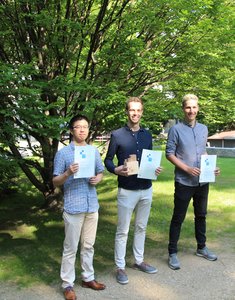Friday, 16 July, 2021
From capturing viruses to bioprinting - Nano Innovation Award 2021
CeNS and four LMU spin-off companies jointly award prizes for innovative doctoral theses.
Three doctoral researchers from Munich have been awarded this year's Nano Innovation Award by the Center for NanoScience. The prize for innovative research in application-oriented nanosciences is worth €9,000. From applicants throughout Bavaria, the winners were selected by an expert jury from industry and academia.
While most science prizes honour excellent results in basic research, the Nano Innovation Award focuses on high innovation and application potential. The companies attocube systems, ibidi, Nanion Technologies and NanoTemper Technologies, together with CeNS, award the prize to talented and creative young scientists whose results are not only of interest for basic research but also promise future technological applications.
The first prize went to Christian Sigl from TU Munich, who developed the molecular basis for an unconventional antiviral concept. His work is based on the idea of enclosing whole viruses in macromolecular shells that block the molecular interactions between virus and host cell. The DNA origami platform he developed for this purpose offers a promising approach for combating different viruses using the same concept. The shells developed by Christian provide the technical basis for the interdisciplinary EU consortium VIROFIGHT, which will further test and develop the new therapeutic concept.
The jury awarded the second place to Jan Felber from LMU Munich. In his work, he succeeded for the first time in creating cell-selective redox sensors for disease-relevant reductases (a specific group of enzymes). His work opens up a broad spectrum of possible applications in biomedicine, from basic research and use in drug development to clinical diagnostics and therapeutics. Jan Felber has already launched several transfer projects, e.g. a start-up for the development of therapeutics and a collaboration with Tubulis GmbH for a novel and powerful linker for antibody-drug conjugates.
Jun Zhang from Munich University of Applied Sciences secured the third place with a novel bioprinting technology that can transfer cells from a reservoir to a target substrate with very high precision using ultra-short laser pulses. By integrating the setup into an inverted optical microscope, it becomes possible to preselect individual cells from complex cell mixtures. The potential applications are manifold - from fundamental questions in cell biology, to single-cell analysis methods, to the production of organs-on-a-chip and tissue engineering. A BMBF-funded project is now developing a user-friendly, fully automated system based on Jun Zhang's findings.
Four former CeNS spin-offs have been supporting the award since 2015: the companies attocube systems, ibidi, Nanion Technologies and NanoTemper Technologies. "For ibidi, CeNS is a constant source of inspiration through technological and personal exchange and an important link to the scientific community. This year, the work submitted for the Nano Innovation Award once again was characterized by exceptionally high creativity and quality. Congratulations to the winners and all participants!", says Roman Zantl, co-founder and managing director of ibidi and member of the jury this year.


